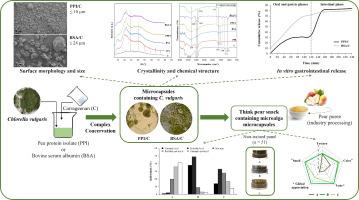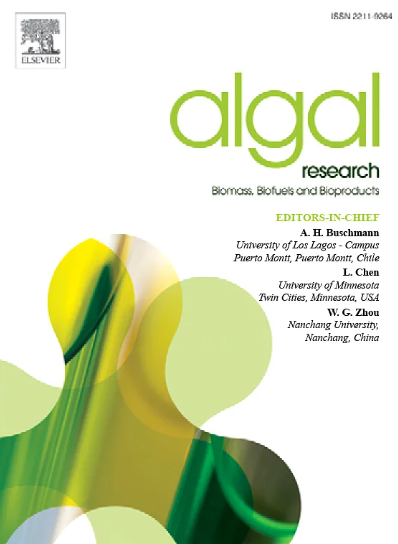Microencapsulation of a green microalga (Chlorella vulgaris) by complex coacervation for its valuation as a feasible ingredient in pear snacks
IF 4.6
2区 生物学
Q1 BIOTECHNOLOGY & APPLIED MICROBIOLOGY
Algal Research-Biomass Biofuels and Bioproducts
Pub Date : 2024-10-01
DOI:10.1016/j.algal.2024.103727
引用次数: 0
Abstract
The nutritional and bioactivity values of Chlorella vulgaris make this green microalga a potential functional food ingredient. However, its unpleasant taste and smell, as well as dark green color, have been considered restrictive for its consumers' acceptability. Here, it was hypothesized that complex coacervation can be used to produce microcapsules able to mitigate the sensory weaknesses of C. vulgaris in think pear snacks, while ensuring their acceptance and intention to buy. For this, two proteins with similar isoelectric points were used, the pea protein isolate (PPI) and the bovine serum albumin (BSA), while the partially-sulfated carrageenan (C) was the selected polysaccharide to encapsulate C. vulgaris (6 % w/w), at pH 3. Higher encapsulation yield (79 %) and efficiency (75 %) were obtained for PPI/C coacervates due to these polymers' higher electrostatic interaction at pH 3, contrasting with the higher repulsion promoted by some negatively charged BSA amino acids. Despite this, both microcapsules exhibited an amorphous structure and low water activity (aw around 0.3). However, PPI/C microcapsules had significantly lower moisture and water solubility (11 % and 57 %, respectively), as well as continuous shells. Moreover, PPI/C avoided the early release of C. vulgaris compounds at gastric conditions ensuring its later release in the intestinal tract. When incorporated into think pear snacks, the higher sensory scores and buying intention were obtained for snacks with PPI/C microcapsules containing C. vulgaris. Therefore, complex coacervation, particularly of PPI/C, allowed to mitigate non-valued microalga sensory attributes contributing for the future acceptance and consumption of algae-based food products.

通过复合共凝胶对一种绿色微藻(小球藻)进行微胶囊化,使其成为梨点心中的一种可行配料
小球藻的营养和生物活性价值使这种绿色微藻成为一种潜在的功能性食品配料。然而,它难闻的味道和气味以及深绿色的颜色被认为限制了消费者对它的接受程度。在此,我们假设可以使用复合共凝胶来生产微胶囊,以减轻梨点心中绿藻的感官弱点,同时确保梨点心的接受度和购买意向。为此,我们使用了两种等电点相近的蛋白质:豌豆蛋白分离物(PPI)和牛血清白蛋白(BSA),并选择部分硫酸化卡拉胶(C)作为多糖,在 pH 值为 3 的条件下封装茨菇(6% w/w)。由于这些聚合物在 pH 值为 3 时具有较高的静电相互作用,与带负电荷的 BSA 氨基酸所产生的较高排斥力形成鲜明对比,PPI/C 共包囊物获得了较高的包囊率(79%)和效率(75%)。尽管如此,这两种微胶囊都表现出无定形结构和较低的水活性(aw 值约为 0.3)。不过,PPI/C 微胶囊的湿度和水溶性(分别为 11% 和 57%)明显较低,而且具有连续的外壳。此外,PPI/C 微胶囊还能避免秃梨树化合物在胃中的早期释放,确保其在肠道中的后期释放。在梨点心中加入含有 C. vulgaris 的 PPI/C 微胶囊后,获得了更高的感官评分和购买意向。因此,复合共凝胶,尤其是 PPI/C,可以减轻微藻的非价值感官属性,有助于未来藻类食品的接受和消费。
本文章由计算机程序翻译,如有差异,请以英文原文为准。
求助全文
约1分钟内获得全文
求助全文
来源期刊

Algal Research-Biomass Biofuels and Bioproducts
BIOTECHNOLOGY & APPLIED MICROBIOLOGY-
CiteScore
9.40
自引率
7.80%
发文量
332
期刊介绍:
Algal Research is an international phycology journal covering all areas of emerging technologies in algae biology, biomass production, cultivation, harvesting, extraction, bioproducts, biorefinery, engineering, and econometrics. Algae is defined to include cyanobacteria, microalgae, and protists and symbionts of interest in biotechnology. The journal publishes original research and reviews for the following scope: algal biology, including but not exclusive to: phylogeny, biodiversity, molecular traits, metabolic regulation, and genetic engineering, algal cultivation, e.g. phototrophic systems, heterotrophic systems, and mixotrophic systems, algal harvesting and extraction systems, biotechnology to convert algal biomass and components into biofuels and bioproducts, e.g., nutraceuticals, pharmaceuticals, animal feed, plastics, etc. algal products and their economic assessment
 求助内容:
求助内容: 应助结果提醒方式:
应助结果提醒方式:


